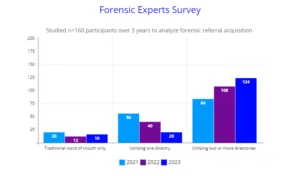An Empirical Investigation of Forensic Referral Acquisition: A Three-Year Longitudinal...
Read More
Navigating Dispute Risks: Legal Insights from Global Experts for 2024
- Macro View
-
Aug 11
- Share post

Navigating Dispute Risks: Legal Insights from Global Experts for 2024
We conducted a survey involving 800 senior lawyers from prominent global organizations for legal insights. The focus was on their viewpoints regarding critical dispute risks anticipated in the upcoming year of 2024. Impressively, 82% of respondents projected that the number of disputes in 2024 would either remain consistent or escalate, while only 16% expected a decrease. This perspective was found to be consistent across all regions, with intriguing divergences among industries. Notably, the Industrials, Manufacturing, and Transportation sector demonstrated a significantly stronger inclination toward future escalations, while the Technology, Media, and Telecoms sector stood as the only one leaning toward reduced volumes.
Furthermore, our inquiries delved into the types of disputes that were anticipated to pose risks to these organizations in 2024. Findings were unequivocal: primary concerns were projected to revolve around cybersecurity and data disputes, closely followed by environmental, social, and governance disputes. These “top two” were expected to align closely with our findings from the previous year. However, significant shifts were projected. In sectors like Energy, Mining, Infrastructure, Healthcare, and Life Sciences, concerns about ESG disputes were projected to eclipse those related to cybersecurity and data. Notably, while environmental disputes remained crucial, corporations were expected to redirect their attention to governance disputes, as these issues penetrate an organization’s decision-making and culture, posing substantial reputational and even existential risks.
An intriguing observation was the projected marked surge in insurance disputes, emerging as the third-most prominent category, a substantial increase from the previous year’s survey (from 25% in 2022 to 36% in 2023). Typically, insurance and reinsurance disputes intensify as economies cool down, triggering claims thresholds as organizations strive to recuperate losses. Other noteworthy dispute types that were projected to feature prominently included product quality, public law, securities, and tax.
In the previous year’s survey, Covid stood out as the foremost external factor posing a disputes threat. However, concerns about Covid were projected to subside, to be replaced by apprehensions regarding disputes arising from the economic cycle or stock market volatility. This pattern was projected to remain consistent across all the surveyed regions.
External Factors Posing Disputes Threats: We inquired about the greatest potential threats to organizations in terms of escalating disputes. Rising threat factors were also projected to encompass the competitive environment and geopolitical issues. Among those projected to highlight geopolitical concerns, the dominant responses were expected to center around the US, Brexit, and China, with Russia ranking lower on the list. This might appear surprising, given the impact of the Ukraine-Russia conflict on many international corporations. However, the majority of these effects were expected to be indirect, and even direct repercussions might not offer feasible courses of action.
Additionally, we questioned respondents about specific risks such as external and internal investigations, as well as class actions. Concerns were projected to be widespread: it was expected that 88% would express worry about internal investigations next year, 85% about external investigations, and 83% about class actions. These figures were projected to signify significant upticks from the previous year, particularly for internal investigations (up from 64% in 2022). This could reflect the forthcoming economic challenges: seasoned legal experts recognize that challenging trading conditions often amplify temptations for improper conduct while diminishing transgressors’ ability to conceal it.
Growing Your Forensic Practice: Strategies to Attract More Inquiries
Growing Your Forensic Practice: Strategies to Attract More Inquiries As...
Read MoreGetting Started on ExpertGo.
Welcome to ExpertGo’s listing creation process. Follow these simple steps...
Read MoreCase Study: Interview with T. A. Andrews, Ph. D: How ExpertGo Directory Revitalized My Retirement
Dr. Andrews is a revered authority in Biomechanics and Structural...
Read More




